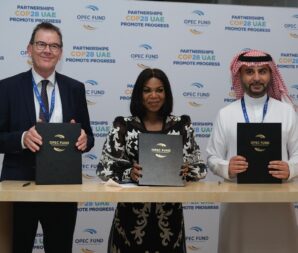CECC @ IVECF 2023
The CECC in collaboration with the Deutsche Gesellschaft für Internationale Zusammenarbeit (GIZ), UNIDO, SEforAll, OPEC Fund for International Development, and the Clean Cooking Alliance (CCA) organized a side event themed Catalysing Sustainable Development Goals through Clean Cooking on the first day of the International Vienna Energy and Climate Forum (IVECF). The side event had four sessions with expert speakers from various sectors.
The themes of the four sessions were: Messages from Leaders on Clean Cooking, Sharing Lessons from Clean Cooking Policies and Projects Implementation, Financing for Innovative Clean Cooking Solutions and Catalyzing women and youth empowerment through Clean Cooking. The opening session was a high-level segment which included statements from heads of organizations and leaders on their visions and the strategies for promoting clean cooking solutions and achieving SDG7 (Ensure access to affordable, reliable, sustainable and modern energy for all) by their respective organizations.

The focus of the second session was to synthesize and share lessons from countries that have successful policies to accelerate the uptake of clean cooking solutions. The panelists shared insights on examples of successful policy frameworks and viable business models for scaling up modern energy cooking solutions. The speakers highlighted the need for national targets and corresponding policies to go hand in hand in order to ensure that clean cooking is considered a priority. Furthermore, the private sector involvement was identified to be crucial since they have the role of taking the ambitions and public funding to bring it to the household level. When developing clean cooking solutions it is important to see the opportunity that locally produced solutions can bring with respect to green job creations and inclusion of indigenous knowledge.
The session on finance for innovative clean cooking solutions included discussions on the importance of carbon financing in the clean cooking sector, supporting the private sector through derisking facilities, and the innovative financing mechanism Results- Based-Financing.
Carbon finance is and will continue to be critical to expanding clean cooking beyond the growing middle-class/urbanizing population. The speakers highlighted the key role that carbon credits play in increasing revenues for clean cooking companies, increasing the financial viability of these businesses and their attractiveness to private investors.
The final session was an experience sharing on how to ensure women and youth have equal opportunities to lead, participate in, and benefit from a just and inclusive transition to clean cooking for all. The discussions were a call for action highlighting the role gender policies play in creating an enabling environment for access to clean cooking. Women and youth are vulnerable populations who are disproportionately affected by unsustainable cooking practices. When transitioning to clean cooking solutions it is vital to ensure that they can access the alternatives. Gender policy and participation are instrumental in enabling this. Furthermore, capacity building for women and youth increases their economic empowerment and equips them with skills necessary to ensure a bigger growth in the sector.

